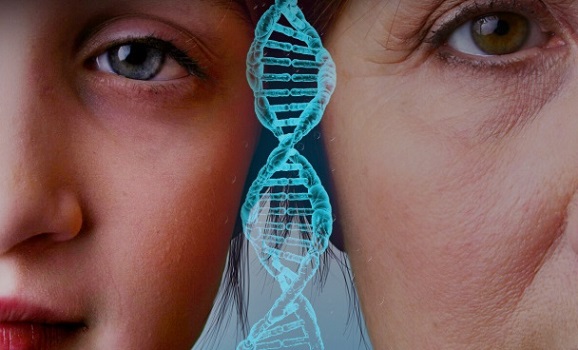Nikhil Prasad Fact checked by:Thailand Medical News Team Feb 01, 2025 2 months, 1 week, 4 days, 18 hours, 11 minutes ago
Medical News: The human skin, the body’s largest organ, serves as a critical barrier, protecting us from environmental hazards, regulating temperature, and enabling sensory experiences. Despite its robustness, skin is not impervious to damage or the effects of aging. Researchers from the Aristotle University of Thessaloniki in Greece have delved into the complex interplay between genetics, environment, and cellular mechanisms that govern skin health and aging, with a specific focus on epigenetics.
 Epigenetics and Skin Aging
Epigenetics and Skin Aging
This
Medical News report highlights the fascinating findings of a review that explores how epigenetic mechanisms - the regulation of gene expression without altering the DNA sequence - play a pivotal role in maintaining skin homeostasis and influencing the aging process.
The Building Blocks of Skin
Skin comprises three main layers: the epidermis, dermis, and hypodermis. Each layer has unique functions. The epidermis, made up of keratinocytes, melanocytes, and immune cells, acts as the primary shield against harm. The dermis provides structural support, hosting blood vessels, glands, and nerves, while the hypodermis cushions and insulates the body.
The skin’s dynamic nature necessitates precise cellular control to maintain homeostasis. This involves constant cell renewal and responsiveness to external stressors - a process heavily influenced by epigenetic factors such as DNA methylation, histone modifications, and non-coding RNAs.
Understanding Epigenetics in Skin Function
Epigenetics involves modifications that alter gene activity without changing the DNA sequence. These changes affect chromatin structure and transcriptional accessibility, influencing cellular behavior. Key mechanisms include:
-DNA Methylation: This process involves adding methyl groups to DNA, typically silencing gene expression. Enzymes such as DNA methyltransferases (DNMTs) are central to this process. In the skin, DNMT1 maintains methylation patterns crucial for basal cell renewal and suppresses differentiation.
-Histone Modifications: Histones, proteins around which DNA is wrapped, can undergo chemical changes like acetylation and methylation. These modifications either loosen or tighten chromatin, regulating gene accessibility. For instance, histone acetylation promotes transcriptional activation, while methylation can either activate or repress genes.
-Non-Coding RNAs (ncRNAs): Small RNA molecules like microRNAs (miRNAs) and long non-coding RNAs (lncRNAs) regulate gene expression post-transcriptionally. For example, miR-203 encourages epidermal differentiation by suppressing stem cell proliferation.
Epigenetic Insights into Skin Ageing
As skin ages, it exhibits hallmark signs such as thinning, wrinkling, and reduced elasticity. The study reveals that epigenetic alterations underlie many of these changes. For instance:
/>
-DNA Methylation Patterns: Aging skin shows global hypomethylation, accompanied by hypermethylation in specific gene promoters. This duality affects processes like cell cycle regulation and inflammation.
-Histone Dynamics: Changes in histone modifications impact chromatin structure. Increased levels of histone variant H2A.J in aged keratinocytes correlate with impaired cell proliferation and differentiation.
-Role of miRNAs: miRNAs like miR-23a-3p, miR-181a, and miR-30a have been implicated in aging. For example, miR-23a-3p inhibits hyaluronan synthase, reducing skin hydration and elasticity.
Skin Homeostasis: A Delicate Balance
Skin homeostasis relies on the equilibrium between stem cell renewal, differentiation, and apoptosis. The study underscores how epigenetic factors regulate this balance:
-Stem Cells in the Epidermis: DNMT1 is essential for maintaining basal stem cell populations. Its absence disrupts self-renewal, leading to premature differentiation.
-Hair Follicle Health: DNMT1 also supports hair follicle regeneration. Mice lacking DNMT1 exhibit progressive hair loss, underscoring its importance.
-Epigenetic Reversibility: Unlike permanent DNA mutations, epigenetic changes are reversible, presenting therapeutic potential for age-related skin conditions.
Therapeutic Implications and Future Directions
Understanding the epigenetic landscape of skin aging opens avenues for targeted therapies. By modulating DNA methylation, histone modifications, or ncRNAs, researchers aim to slow or reverse aging processes. For example, inhibiting histone deacetylases (HDACs) has shown promise in enhancing skin regeneration.
The study also highlights the potential of personalized medicine. Integrating epigenetic biomarkers into diagnostics could lead to tailored treatments that address individual aging profiles.
Conclusions
This extensive research emphasizes the central role of epigenetics in skin biology. Key findings reveal that:
-DNA methylation patterns regulate cell renewal and differentiation.
-Histone modifications influence chromatin dynamics and gene expression.
-Non-coding RNAs orchestrate complex regulatory networks, affecting aging phenotypes.
Epigenetic interventions hold immense promise for improving skin health and combating age-related conditions. However, further studies are needed to elucidate the precise mechanisms and translate findings into clinical applications. The interplay of genetics, environment, and lifestyle adds layers of complexity to skin aging, necessitating interdisciplinary efforts to develop effective therapies.
The study findings were published in the peer-reviewed journal: Epigenomes.
https://www.mdpi.com/2075-4655/9/1/3
For the latest on Skin Health, keep on logging to Thailand
Medical News.
Read Also:
https://www.thailandmedical.news/news/bee-venom-shows-potential-in-delaying-skin-aging
https://www.thailandmedical.news/news/french-study-uncovers-skin-antiaging-effects-of-milk-thistle-extract
https://www.thailandmedical.news/news/taiwanese-scientists-discover-beneficial-properties-of-red-algae-for-scar-prevention-and-skin-regeneration
https://www.thailandmedical.news/news/quercitrin-from-green-ball-apples-and-its-protective-role-against-skin-aging
